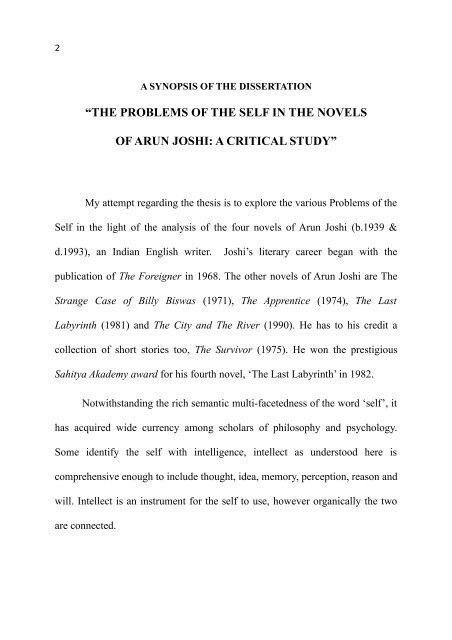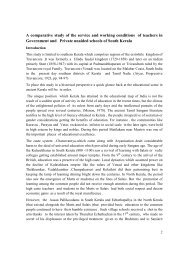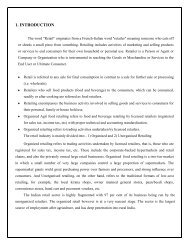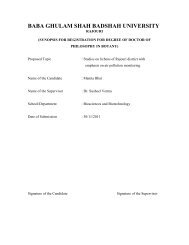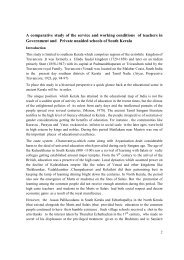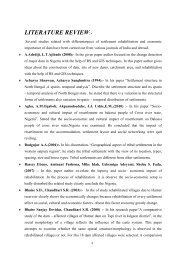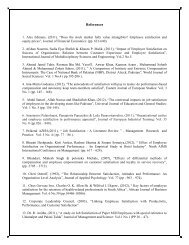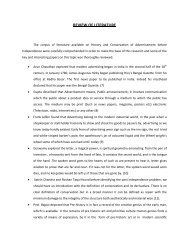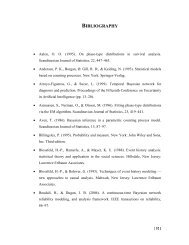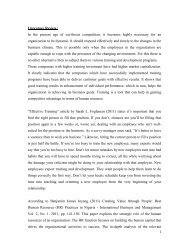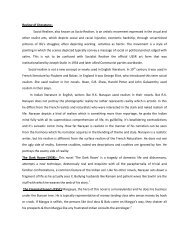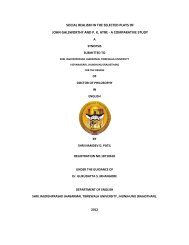the problems of the self in the novels of arun joshi: a critical study
the problems of the self in the novels of arun joshi: a critical study
the problems of the self in the novels of arun joshi: a critical study
You also want an ePaper? Increase the reach of your titles
YUMPU automatically turns print PDFs into web optimized ePapers that Google loves.
2<br />
A SYNOPSIS OF THE DISSERTATION<br />
“THE PROBLEMS OF THE SELF IN THE NOVELS<br />
OF ARUN JOSHI: A CRITICAL STUDY”<br />
My attempt regard<strong>in</strong>g <strong>the</strong> <strong>the</strong>sis is to explore <strong>the</strong> various Problems <strong>of</strong> <strong>the</strong><br />
Self <strong>in</strong> <strong>the</strong> light <strong>of</strong> <strong>the</strong> analysis <strong>of</strong> <strong>the</strong> four <strong>novels</strong> <strong>of</strong> Arun Joshi (b.1939 &<br />
d.1993), an Indian English writer. Joshi’s literary career began with <strong>the</strong><br />
publication <strong>of</strong> The Foreigner <strong>in</strong> 1968. The o<strong>the</strong>r <strong>novels</strong> <strong>of</strong> Arun Joshi are The<br />
Strange Case <strong>of</strong> Billy Biswas (1971), The Apprentice (1974), The Last<br />
Labyr<strong>in</strong>th (1981) and The City and The River (1990). He has to his credit a<br />
collection <strong>of</strong> short stories too, The Survivor (1975). He won <strong>the</strong> prestigious<br />
Sahitya Akademy award for his fourth novel, ‘The Last Labyr<strong>in</strong>th’ <strong>in</strong> 1982.<br />
Notwithstand<strong>in</strong>g <strong>the</strong> rich semantic multi-facetedness <strong>of</strong> <strong>the</strong> word ‘<strong>self</strong>’, it<br />
has acquired wide currency among scholars <strong>of</strong> philosophy and psychology.<br />
Some identify <strong>the</strong> <strong>self</strong> with <strong>in</strong>telligence, <strong>in</strong>tellect as understood here is<br />
comprehensive enough to <strong>in</strong>clude thought, idea, memory, perception, reason and<br />
will. Intellect is an <strong>in</strong>strument for <strong>the</strong> <strong>self</strong> to use, however organically <strong>the</strong> two<br />
are connected.
3<br />
Joshi’s <strong>novels</strong> probe deep <strong>in</strong>to <strong>the</strong> dark and <strong>in</strong>nermost issues <strong>of</strong> <strong>the</strong><br />
human m<strong>in</strong>d, illum<strong>in</strong>ate <strong>the</strong> hidden corners <strong>of</strong> <strong>the</strong> physical and mental make-up<br />
<strong>of</strong> <strong>the</strong> characters. In his fictional world, Joshi tries his level best to del<strong>in</strong>eate <strong>the</strong><br />
predicament <strong>of</strong> <strong>the</strong> modern man who is confronted by <strong>the</strong> <strong>self</strong> and <strong>the</strong> question<br />
<strong>of</strong> his existence. As a novelist expos<strong>in</strong>g human predicament, Joshi visualizes <strong>the</strong><br />
<strong>in</strong>ner crisis <strong>of</strong> <strong>the</strong> modern man and f<strong>in</strong>ds and gets conv<strong>in</strong>ced that <strong>the</strong> most<br />
besett<strong>in</strong>g <strong>problems</strong> that man faces today are <strong>the</strong> <strong>problems</strong> <strong>of</strong> <strong>the</strong> <strong>self</strong>, like<br />
alienation, identity crisis, sense <strong>of</strong> void and existential dilemma. These<br />
<strong>problems</strong> are so pervasive that <strong>the</strong>y threaten to eat <strong>in</strong>to every sphere <strong>of</strong> human<br />
activity. As a result, man fails to discern <strong>the</strong> very purpose beh<strong>in</strong>d life and <strong>the</strong><br />
relevance <strong>of</strong> existence <strong>in</strong> a hostile world. When he handles <strong>the</strong>se <strong>problems</strong> <strong>of</strong><br />
<strong>the</strong> <strong>self</strong>, Joshi is careful enough not to bid good bye to our cultural heritage and<br />
imperishable moral values. His fiction explores <strong>self</strong> and br<strong>in</strong>gs to a central focus<br />
<strong>the</strong> way <strong>in</strong> which <strong>the</strong> <strong>self</strong> tries to assess its <strong>in</strong>volvement <strong>in</strong> <strong>the</strong> alienation from<br />
<strong>the</strong> family and society.<br />
Joshi’s characters are mentally disturbed and filled with despair, <strong>self</strong>hatred<br />
and <strong>self</strong>-pity, for <strong>the</strong>y regard <strong>the</strong>mselves as strangers <strong>in</strong> <strong>the</strong> physical<br />
world. Isolated from <strong>the</strong> <strong>self</strong> as well as <strong>the</strong> society and family, Joshi’s characters<br />
are forlorn and tear <strong>the</strong>mselves away from <strong>the</strong> velvety embrace <strong>of</strong> <strong>the</strong>ir society
4<br />
and live like strangers. The struggle <strong>of</strong> <strong>the</strong> protagonist aga<strong>in</strong>st social<br />
conventions and <strong>in</strong>ner conflicts between what he really is and what society<br />
expects him to be, f<strong>in</strong>ds a pivotal place <strong>in</strong> Joshi’s <strong>novels</strong>. For Joshi’s<br />
protagonists, <strong>the</strong> society <strong>of</strong> <strong>the</strong> latter half <strong>of</strong> <strong>the</strong> 20 th<br />
century has lost its<br />
mean<strong>in</strong>g. They have no sense <strong>of</strong> belong<strong>in</strong>g to <strong>the</strong> society <strong>in</strong> which <strong>the</strong>y live. The<br />
live <strong>in</strong> <strong>the</strong>ir own world, th<strong>in</strong>k<strong>in</strong>g <strong>the</strong>ir thoughts, speak<strong>in</strong>g to <strong>the</strong>ir own selves<br />
disappo<strong>in</strong>ted and depressed.<br />
Arun Joshi is concerned with <strong>the</strong> predicament <strong>of</strong> modern man and is<br />
sensitively alive to <strong>the</strong> various dimensions <strong>of</strong> pressures exerted by <strong>the</strong> complex<br />
character and demands <strong>of</strong> <strong>the</strong> society <strong>in</strong> which contemporary man is dest<strong>in</strong>ed to<br />
live. The protagonists <strong>of</strong> his <strong>novels</strong> are abject outsiders and stark strangers. The<br />
awareness <strong>of</strong> man’s rootlessness and strangeness and <strong>the</strong> consequential quest for<br />
a mean<strong>in</strong>gful <strong>self</strong> is <strong>the</strong> keynote <strong>of</strong> Joshi’s <strong>novels</strong>. It is <strong>the</strong> <strong>in</strong>ner crisis <strong>of</strong> <strong>the</strong><br />
modern man that has occupied Arun Joshi’s primary <strong>in</strong>terest <strong>in</strong> his <strong>novels</strong> that<br />
are built around <strong>the</strong> dark and dismal experiences <strong>of</strong> <strong>the</strong> soul.<br />
Though Arun Joshi’s work has attracted serious <strong>critical</strong> attention, no<br />
s<strong>in</strong>gle <strong>critical</strong> approach can really be adequate <strong>in</strong> analyz<strong>in</strong>g <strong>the</strong> multi-faceted<br />
talent <strong>of</strong> a rare genius. Critics and scholars have discussed his fiction on <strong>the</strong><br />
basis <strong>of</strong> evidence provided by his works, letters, and <strong>in</strong>terviews etc., <strong>in</strong> order to
5<br />
approach his work from different angles. Though attempts have been made to<br />
place his work on <strong>the</strong> existentialist, realist, modernist traditions etc., no specific<br />
attempt has been made to focus on <strong>the</strong> various <strong>problems</strong> <strong>of</strong> <strong>the</strong> <strong>self</strong> through <strong>the</strong><br />
analysis <strong>of</strong> his <strong>novels</strong>. There has hardly been any attempt to <strong>study</strong> Joshi’s fiction<br />
on <strong>the</strong> basis <strong>of</strong> <strong>the</strong> personality <strong>problems</strong> <strong>of</strong> his characters from a sociopsychological<br />
perspective. Though <strong>the</strong> attempt is a modest one, <strong>the</strong> issue is a<br />
crucial one, because <strong>in</strong> his <strong>novels</strong> he probes <strong>the</strong> depths <strong>of</strong> human experience to<br />
portray <strong>the</strong><br />
repercussions <strong>of</strong> human conflict on <strong>the</strong> <strong>in</strong>ner lives <strong>of</strong> his<br />
protagonists on <strong>the</strong> one hand, <strong>the</strong>ir psychological, social and religious effects on<br />
<strong>the</strong> o<strong>the</strong>r <strong>in</strong> a subtle manner. Whenever critics have touched upon <strong>the</strong> issue <strong>of</strong><br />
Joshi’s concern with <strong>the</strong> <strong>problems</strong> <strong>of</strong> <strong>the</strong> <strong>self</strong>, <strong>the</strong>y have dealt with it very<br />
vaguely or left <strong>the</strong> discussion <strong>in</strong>complete. Hence this <strong>study</strong> stands justified <strong>in</strong> its<br />
attempt to have a comprehensive search for <strong>the</strong> <strong>problems</strong> <strong>of</strong> <strong>the</strong> <strong>self</strong>. The <strong>study</strong><br />
uses various discipl<strong>in</strong>es like sociology and psychology <strong>in</strong> a flexible manner and<br />
<strong>in</strong> different comb<strong>in</strong>ations. The <strong>study</strong> attempts to broaden <strong>critical</strong> perspectives<br />
that allow a fuller understand<strong>in</strong>g <strong>of</strong> Arun Joshi’s fiction. The <strong>study</strong> also<br />
endeavours to expose <strong>the</strong> pa<strong>in</strong>fulness <strong>of</strong> human isolation and alienation by<br />
<strong>study</strong><strong>in</strong>g <strong>the</strong>m at <strong>the</strong> familial and social levels and goes deep <strong>in</strong>to <strong>the</strong> reasons for<br />
alienation from one’s own <strong>self</strong>, community and family. The <strong>in</strong>troductory chapter
6<br />
<strong>of</strong> this dissertation attempts to make a general survey and criticism <strong>of</strong> Joshi’s<br />
four major <strong>novels</strong> and a brief picture <strong>of</strong> <strong>the</strong> major <strong>in</strong>fluences on <strong>the</strong> author.<br />
The second chapter exam<strong>in</strong>es specifically <strong>the</strong> sense <strong>of</strong> alienation and void<br />
experienced by <strong>the</strong> pr<strong>in</strong>cipal characters <strong>in</strong> <strong>the</strong> <strong>novels</strong> <strong>of</strong> Arun Joshi. Modern<br />
man f<strong>in</strong>ds him<strong>self</strong> estranged not only from his fellow men, but also from<br />
him<strong>self</strong>, hav<strong>in</strong>g noth<strong>in</strong>g to fall back upon <strong>in</strong> moments <strong>of</strong> crisis. He suffers from<br />
a gnaw<strong>in</strong>g sense <strong>of</strong> void and mean<strong>in</strong>glessness. In discuss<strong>in</strong>g <strong>the</strong> <strong>the</strong>me <strong>of</strong><br />
alienation <strong>in</strong> Arun Joshi’s <strong>novels</strong>, we are ma<strong>in</strong>ly concerned first with man’s<br />
alienation from society which is <strong>the</strong> most prevalent k<strong>in</strong>d <strong>of</strong> alienation and<br />
secondly his alienation from his own <strong>self</strong>. Arun Joshi’s recurrent <strong>the</strong>me is<br />
alienation <strong>in</strong> different aspects and his heroes are <strong>self</strong>-centered persons prone to<br />
<strong>self</strong>-pity and escapism. In spite <strong>of</strong> <strong>the</strong>ir weaknesses, <strong>the</strong>y are, however, genu<strong>in</strong>e<br />
seekers who strive to grope towards <strong>the</strong> purpose <strong>in</strong> life and <strong>self</strong>-fulfilment. In<br />
his <strong>novels</strong>, Joshi attempts to deal with <strong>the</strong> various facets <strong>of</strong> <strong>the</strong> <strong>the</strong>me <strong>of</strong><br />
alienation <strong>in</strong> relation to <strong>self</strong>, <strong>the</strong> society around and humanity at large. Arun<br />
Joshi’s fiction is filled with <strong>the</strong> people who are alienated from <strong>the</strong>mselves, from<br />
God and society. His fiction is a s<strong>in</strong>cere effort to analyze his unique way <strong>of</strong><br />
handl<strong>in</strong>g <strong>the</strong> <strong>the</strong>me <strong>of</strong> alienation. An attempt is made here to exam<strong>in</strong>e how best<br />
Arun Joshi tackles <strong>the</strong> problem <strong>of</strong> alienation <strong>in</strong> <strong>the</strong> modern Indian context.
7<br />
Chapter three elucidates Joshi’s depiction <strong>of</strong> <strong>the</strong> element <strong>of</strong> identity crisis<br />
manifested <strong>in</strong> <strong>the</strong> form <strong>of</strong> spiritual decl<strong>in</strong>e, moral degeneration, slothfulness and<br />
psychic perversions with special reference to <strong>the</strong> four <strong>novels</strong>. The need to feel a<br />
sense <strong>of</strong> identity stems from <strong>the</strong> very condition <strong>of</strong> human existence. Quest for<br />
identity is <strong>the</strong> reflection <strong>of</strong> any modern man who is without roots <strong>of</strong> any k<strong>in</strong>d:<br />
social, spiritual, personal or any o<strong>the</strong>r. Identity crisis <strong>in</strong> general refers to<br />
psychological stress or anxiety about <strong>the</strong> sense <strong>of</strong> identity. A person undergoes<br />
<strong>the</strong> psychologically distress<strong>in</strong>g experience when he feels that his personal<br />
identity is be<strong>in</strong>g spoiled or threatened. In short, identity crisis means <strong>the</strong> feel<strong>in</strong>g<br />
<strong>of</strong> <strong>the</strong> loss <strong>of</strong> a sense <strong>of</strong> personal identity or depersonalization. When a person<br />
loses his sense <strong>of</strong> identity, he feels alienated and lonely and makes frantic effort<br />
to seek, organize and affirm his sense <strong>of</strong> identity.<br />
Chapter four discusses <strong>the</strong> existentialist aspects <strong>in</strong> Arun Joshi’s <strong>novels</strong>.<br />
Existentialist th<strong>in</strong>kers chose to def<strong>in</strong>e and describe <strong>the</strong> burn<strong>in</strong>g human<br />
experiences <strong>of</strong> anxiety, anguish, guilt, dread, despair, alienation, absurdity etc.,<br />
<strong>of</strong> <strong>the</strong> post war world <strong>in</strong> <strong>the</strong>ir own ways. Their f<strong>in</strong>d<strong>in</strong>gs did exert tremendous<br />
<strong>in</strong>fluence on <strong>the</strong> thought pattern <strong>of</strong> <strong>the</strong> literary artists all over <strong>the</strong> world. There is<br />
a very pronounced impact <strong>of</strong> existentialism on Arun Joshi’s writ<strong>in</strong>gs. All his<br />
<strong>novels</strong> from The Foreigner to The City and The River have <strong>in</strong> <strong>the</strong>m an
8<br />
undercurrent <strong>of</strong> existentialist philosophy. Arun Joshi who is obsessively<br />
concerned with <strong>the</strong> human predicament explores <strong>the</strong> human psyche so as to<br />
unravel <strong>the</strong> mystery <strong>of</strong> <strong>the</strong> human existence. Like Sartre, Joshi is also primarily<br />
concerned with <strong>the</strong> action that is concrete and directed towards <strong>the</strong> <strong>in</strong>dividual<br />
who is free to choose for him<strong>self</strong> a personal way <strong>of</strong> life out <strong>of</strong> noth<strong>in</strong>gness and<br />
vacuity around.<br />
The fifth chapter dwells upon <strong>the</strong> fictional techniques that Arun Joshi<br />
employs <strong>in</strong> elucidat<strong>in</strong>g and establish<strong>in</strong>g his <strong>the</strong>mes. Joshi adopts <strong>the</strong> first person<br />
narrative technique <strong>in</strong> The Foreigner, The Apprentice and The Last Labyr<strong>in</strong>th.<br />
The Strange Case <strong>of</strong> Billy Biswas, like Conrad’s Lord Jim, is narrated from <strong>the</strong><br />
witness-narrator’s po<strong>in</strong>t <strong>of</strong> view. Ano<strong>the</strong>r novel fictional technique that Arun<br />
Joshi resorts to is dramatic monologue. Joshi’s <strong>novels</strong> are ra<strong>the</strong>r rich <strong>in</strong> imagery.<br />
Arun Joshi’s is very good at similes and metaphors as well. One <strong>of</strong> <strong>the</strong> most<br />
powerful fictional techniques employed by Joshi is <strong>the</strong> technique <strong>of</strong> flashback<br />
or rem<strong>in</strong>iscence. Joshi was also fond <strong>of</strong> <strong>the</strong> use <strong>of</strong> archetypes <strong>in</strong> his <strong>novels</strong>.<br />
Apart from us<strong>in</strong>g <strong>the</strong> image <strong>of</strong> labyr<strong>in</strong>th and void, Joshi explores <strong>the</strong> existential<br />
anguish with <strong>the</strong> help <strong>of</strong> <strong>the</strong> language <strong>of</strong> <strong>the</strong> dreams. The dreams function as a<br />
mirror which reflects <strong>the</strong> <strong>in</strong>tricate work<strong>in</strong>gs <strong>of</strong> <strong>the</strong> <strong>in</strong>ner m<strong>in</strong>d <strong>of</strong> <strong>the</strong> characters.
9<br />
These narrative devices and fictional techniques smoothly blend with Joshi’s<br />
unique handl<strong>in</strong>g <strong>of</strong> <strong>the</strong> subject <strong>of</strong> <strong>the</strong> <strong>problems</strong> <strong>of</strong> <strong>the</strong> <strong>self</strong>.<br />
Chapter six is <strong>the</strong> conclusion, which weaves toge<strong>the</strong>r and sums up <strong>the</strong><br />
<strong>the</strong>mes <strong>of</strong> <strong>the</strong> previous chapters. It can be found that Joshi’s vision does not<br />
limit it<strong>self</strong> to <strong>the</strong> mean<strong>in</strong>glessness and <strong>in</strong>determ<strong>in</strong>acy <strong>of</strong> <strong>the</strong> world. Amidst <strong>the</strong><br />
pervad<strong>in</strong>g gloom and monotony <strong>of</strong> <strong>the</strong>ir universe, most <strong>of</strong> <strong>the</strong> protagonists <strong>of</strong><br />
Joshi feel impelled to live <strong>in</strong> some acts <strong>of</strong> k<strong>in</strong>dness and benevolence that<br />
ennoble human life. Just as Eliot proposes a conditional escape from <strong>the</strong><br />
degenerate state <strong>of</strong> affairs, Joshi also presents at least a few examples <strong>of</strong><br />
liberat<strong>in</strong>g human actions. Joshi’s characters are true representatives <strong>of</strong> modern<br />
men who are engaged <strong>in</strong> <strong>the</strong> quest for <strong>the</strong> <strong>self</strong> and search for mean<strong>in</strong>g <strong>in</strong> life.


